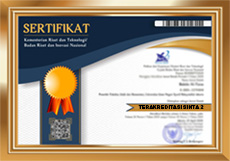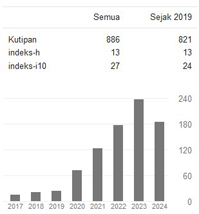Tractatus Politicus dan Demokrasi: Risalah Model-model Rezim yang Rasional
Abstract
Abstract: Tractatus Politicus is a work of Spinoza's political philosophy which discusses regime models arranged in stages according to the level of use of reason: Monarchy is rational, aristocracy is more rational, and democracy is most rational. Spinoza, who is known as the prophet of reason, established rationality as a normative standard for
the three types of regimes. The rationality of a regime is measured by the size of the council which is tasked with discussing and controlling all state policies and Spinoza considers democracy to be the most rational because democracy allows for a people's council that is bigger than monarchy and aristocracy. Supomo adopted Spinoza's views as one of the philosophical sources for his state theory known as the "Staatsidee Integralistik". Interestingly, Spinoza saw democracy as the best model of government, while Supomo, who referred to Spinoza, actually rejected democracy. Simanjuntak then conducted a critical study of the philosophical source of the controversial “Staatsidee Integralistik”. However, Simanjuntak's study became more controversial, because he found that not only Supomo rejected democracy but also Spinoza. This study aims to respond to all these controversies and finds that while it is true that Supomo rejects democracy, it is not true that Spinoza rejects democracy. Spinoza was a staunch rationalist who supported democracy.
Key words: Politics, democracy, theocracy, organistic state, integralistic state.
Full Text:
PDFReferences
Amstrong, Aurelia, “Natural and Unnatural Communities: Spinoza Beyond Hobbes”, dalam British Journal for the History of Philosophy, Vol. 17. No. 2, 2009: 179-305.
Balibar, Etienne, “Spinoza: from Individuality to Transindividuality”, dalam Medeleingen vanwege het Spinjozahuis, Vol. 71, Delft: Eburon, 1997
Barbone, Steven, “What Counts as an Individual for Spinoza?”, dalam Spinoza: Metaphysical Themes. Olli I. Koistinen and John I. Biro (eds.). New York: Oxford University Press, 2001: 89-112.
Baturschat, Wolfgang, “The Ontological Basis of Spinoza’s Theory of Poltics”, dalam Spinoza’s Political and Theological Thought. C. De Deugh (ed.). Smsterdam: North-Holland Publishing, 1984, 30-36.
Blom, Hans, “Spinoza on Res Publica, Republics and Monarchies”, dalam Monarchsim in the Age of Enlightement: Liberty, Patriotism, and the Public Good. Hans Blom, John Christian Laursen, and Luisa Simonutti (eds.). Toronto: University of Toronto Press, 2007: 19-44.
Bourchier, David, Pancasila Versi Orde Baru dan Asal Muasal Negara Organis (Integralistik), Yogyakarta: Aditya Media, 2007: iii-xv
Carriero, John, “On the Relationship Between Mode and Substance in Spinoza’s Metaphysics” in Derk Pereboom (ed.), The Rationalists: Critical Essays on Descartes, Spinoza, and Leibniz. New York: Rowman & Littlefield, 1999: 133-164.
Della Rocca, Michael, “Spinoza’s Substance Monism”, dalam Olli Koistinen & John Biro (ed.), Spinoza: Metaphysical Themes. New York: Oxford, 2022: 11-37.
Eckstein, Walter, “Rousseau and Spinoza: Their Political Theories and Their Conception of Ethical Freedom”, dalam Journal of the History of Ideas, 5 (3), 1944: 259-291.
Hutagalung, Daniel, Menapaki Jejak-jejak Pemikiran Supomo Mengenai Negera Indonesia”, dalam JENTERA, Jurnal Hukum, Vol. 3, Oktober, 2005.
Israel, Jonathan, “The Early Dutch and German Spinoza Reception”, in Yitzhak Melamed and Michael Rosenthal (eds.), Spinoza’s Theological-Political Treatise: A Critical Guide, Cambridge: Cambridge University Press, 2010: 72-100.
Jegalus, Norbertus. “Das Integralistische Staatsverstandnis nach Adam Muller (1779-1829) und seine Rezeption in Indonesien. Zur Debatte um die Gestalt des Indonesischen Staates und die Interpretation der Pancasila-Doktrin,” Thesis, Hochschule fur Philosophie, Philosophische Fakultat S.J. Munchen, 2000.
Jegalus, Norbertus, Das Verhaltnis von Politik, Religion und Zivilreligion, untersuct am Beispiel der Pancasila. Munchen: Herbert Utz Verlag, 2009.
Jegalus, Norbertus, “Modernizing Religion and Culture: Sutan Takdir Alisjahbana’s Philosophical Perspective of Values”, in Indonesia Journal of Interdisciplinary Islamic Studies, Vol 3, No. 2, 2020: 1-20.
Kamal, Muhammad, “Spinoza and the Relativity of Evil in the World”, dalam Open Journal of Philosophy, 8, May, 2018.
Malcolm, Noel. “Hobbes and Spinoza”, dalam The Cambridge History of Political Thought 1450-1700. J. H. Burns (ed.). Cambridge: Cambridge University Press, 1991: 530-560.
Melamed, Yitzhak. “Spinoza’s Metaphysics of Substance. The Substance-Mode Relation as a Relation of Inherence and Predication”, in Philosophy and Phenomenological Research, 1: 2009: 17-82.
Nadler, Steven, Spinoza: A Life. Cambridge: Cambridge University Press, 1999.
Nadler, Steven. A Book Forged in Hell: Spinoza’s Scandalous Treatise and the Birth of the Secular Age. Princeton: Princeton University Press, 2011.
Prokhvnik, Raia, Spinoza and Republicanism. London and New York: Palgrave Macmillan, 2004.
Prokhvnik, Raia, “From Democracy to Aristokracy: Spinoza, Reason and Politics”, dalam History of Eeuropean Ideas, Vol. 23. No. 2-4, 1997: 105-115.
Robert McShea, The Political Philosophy of Spinoza. New York: Columbia University Press, 1968.
Sacksteder, William, “How Much Hobbes Might Spinoza Have Read?”, dalam Southwestern Journal of Philosophy, 1980: 25-40.
Simanjuntak, Marsilam, Pandangan Negara Integralistik. Sumber, Unsur, dan Riwayatnya Dalam Persiapan UUD 1945. Jakarta: Grafiti, 2003.
Steinberg, Justin, “On Being Sui Iuris: Spinoza and the Republican Idea of Liberty”, in History of European Ideas, 34 (3), 2008: 239-249.
Steinberg, Justin, “Spinoza on Civil Liberation”, in Journal of the History of Philosophy, 47 (1), 2009: 35-58.
Steinberg, Justin, “Benedict Spinoza: Epistemic Democrat”, in History of Philosophy Quarterly, 27 (2), 2010a: 145-164.
Steinberg, Justin, “Spinoza’s Curious Defense of Toleration”, in Yitzhak Melamed and Michael Rosenthal (eds.), Spinoza’s Theological-Political Treatise: A Critical Guide (Cambridge: Cambridge University Press, 2010b: 210-230.
Steinberg, Justin, “Spinoza and Political Absolutism”, in Yitzhak Melamed and Michael Rosenthal (eds.), Spinoza’s Political Treatise: A Critical Guide, Cambridge: Cambridge University Press, 2018: 175-189.
Sugiarto, Laga, “Mengetahui dan Memahami Konsepsi Negara Kesatuan Republik Indonesia (Pandangan Negara Integralistik Dalam Pembukaan UUD Negara Republik Indonesia Tahun 1945)”, Thesis Magister Hukum, Universitas Brawijaya Malang, 2013.
Wahyudi, Agus, “Menimbang Sejarah Pemikiran, Menata Kembali Hari Depan”, Catatan Pengantar dalam David Bourchier, Pancasila Versi Orde Baru dan Asal Muasal Negara Organis (Integralistik), Yogyakarta: Aditya Media, 2007: iii-xv
DOI: http://dx.doi.org/10.31385/jl.v22i2.379.102-119
Refbacks
- There are currently no refbacks.

This work is licensed under a Creative Commons Attribution-NonCommercial-ShareAlike 4.0 International License.

Copyright© 2015 JURNAL LEDALERO This work is licensed under a Creative Commons Attribution-NonCommercial-ShareAlike 4.0 International License.
Institut Filsafat dan Teknologi Kreatif Ledalero Jalan Trans Maumere-Ende - Sikka - Flores - Nusa Tenggara Timur - Indonesia Telp/Fax: 0382 2426535










